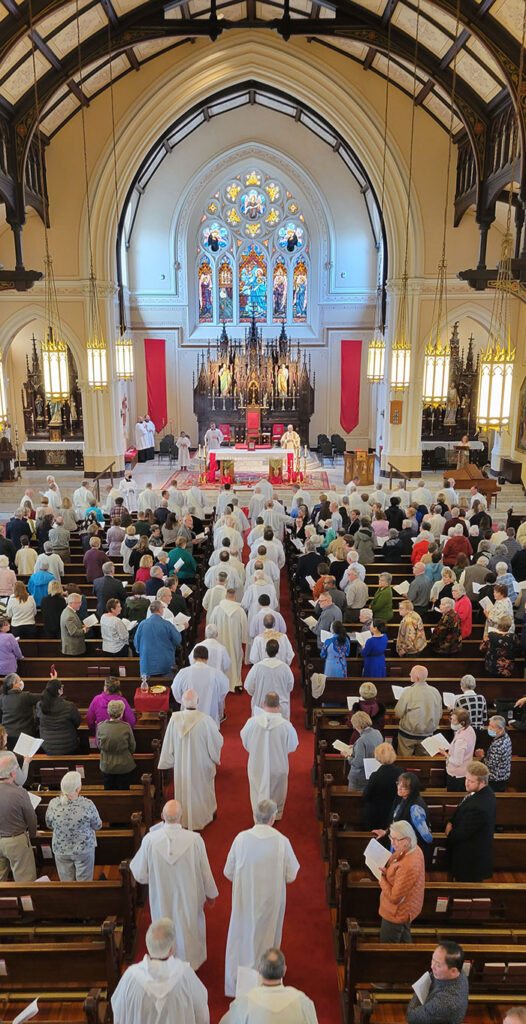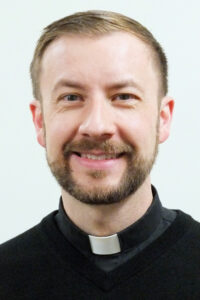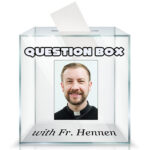
Priests and deacons process into Sacred Heart Cathedral in Davenport during the Chrism Mass in this 2022 photo.
By Fr. Thom Hennen
Question Box Column

On April 3, Bishop Thomas Zinkula will gather with the priests and deacons of the Diocese of Davenport, and the lay faithful who are able to attend, at Sacred Heart Cathedral for this ancient, beautiful and solemn liturgy. While more traditionally celebrated on Holy Thursday morning, the Chrism Mass may be celebrated on a different day prior to Easter. Given the general busyness of Triduum and the distances that many of the priests have to travel, in recent years our diocese has celebrated the Chrism Mass on the Monday of Holy Week or even the week prior, in conjunction with our annual Clergy Convocation.
In one sense, the Chrism Mass is the local Church’s annual “oil change.” Early Christian texts describe a blessing and consecration of oils as early as the 3rd century. At the Chrism Mass the Oil of Catechumens, used in the pre-baptismal rites, and the Oil of the Sick, used for the sacrament of the Anointing of the Sick, are blessed. The Sacred Chrism, used for the post-baptismal anointing, for Confirmation, for the ordination of priests and bishops, and for the dedication of churches and altars, is consecrated. In case of need, any priest may bless the Oil of Catechumens or the Oil of the Sick but only a bishop can consecrate the Sacred Chrism. The oils themselves must be plant-based (we use olive oil) and to the Chrism is added balsam, which gives it a darker color and a wonderful fragrance.
The other aspect of the Chrism Mass, as described in the Roman Missal, is that it is to be “a manifestation of the Priests’ communion with their Bishop.” For this reason, in addition to that most important sign of communion of sharing in the Eucharist with each other, the priests also renew their priestly promises. It’s not as though these promises expire and that we need to “re-up” each year but it is a powerful reminder of the commitment we made at ordination and of our connection with our bishop as “co-workers in the vineyard.”
My earliest personal recollection of the Chrism Mass is as a seminarian. The seminarians of the diocese would typically serve for this Mass and immediately following, go next door to the rectory to carefully transfer the oils from large urns to the bottles to be distributed later to the priests. Many helping hands from the chancery staff now make light work of this.
What happens to the old oil, you ask? Last year (my first at the cathedral), we bought a new metal outdoor fire pit for the Easter fire. In addition to the wood and kindling, we added the cathedral’s old oils as these should be properly disposed of either by burying or burning them. It was a noble idea. What we did not anticipate was that all of the oil would pool at the bottom. Once the fire was really going, the oil heated up and it sounded like a deep-fat fryer. Balsam-infused holy french fries anyone? As beautiful and powerful as liturgy can be, and while we absolutely believe that it is principally God’s work, it is also (literally) the “work of the people,” and this is where things can get messy.
Please pray for the bishop, priests and deacons who will gather on Monday for this solemn occasion and for all those who will be anointed with these oils in the coming year. In the words of the late and much loved Father Bill Meyer, “Merry Chrism Mass!”
(Father Thom Hennen serves as the pastor of Sacred Heart Cathedral in Davenport and Vicar General for the Diocese of Davenport. Send questions to messenger@davenportdiocese.org)










